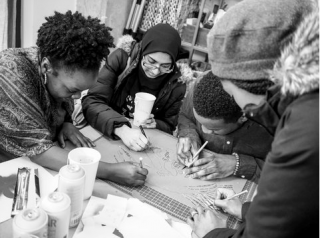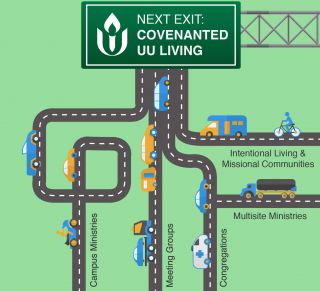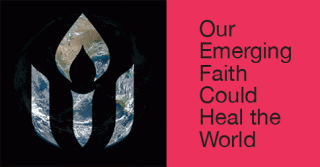Emerging Faith: Beyond the Fads
By Annie Gonzalez Milliken
Covenants Aren’t “Cool,” and Fitness Won’t Fix the World
In April I got to go home for work. I don’t mean home to the house I share with my partner and housemates here in Boston. I mean back to the part of the country I say I’m from, back to the people who raised me and made me Unitarian Universalist (UU). I went back to my childhood state, Illinois, to attend the MidAmerica Regional Assembly.
Like many young adults, I’ve moved a lot. Since I first left home at age 17 I’ve lived in 5 different states and both coasts of the U.S. I’ve also been a part of 6 different UU communities. It felt so comforting to come back home, to the flat endless cornfields of Illinois and to the people who first welcomed my family into this religious movement where we found lifelong friends, inspiration, true community.
Yet, the theme of the assembly was not “welcome home to the familiar” it was “The New in the New Era of Unitarian Universalism” and I was there to present on new models for young adult ministry. How can we commit more fully to racial justice in the new era of #blacklivesmatter activism? How can we serve our youngest adults in the new era of increased technology and decreased attendance at religious services? How can ministers from the millennial generation serve our faith in the new era of entrepreneurial and bi-vocational ministry? These were some of the questions I addressed or heard others address. I was back home in the familiar and yet living into the new era. Both/and.
And we are a both/and faith in terms of the familiar and the new. We are both steeped in the historical Protestant tradition from which we grew and inclusive of so many other theologies and practices. That is especially evident here in Boston where a congregation can talk about things like “selling the colonial silver” and then hold a dynamic theatre and gymnastics filled multigenerational worship service to honor the Persian holiday of Norooz in front of their stately old elevated pulpit. Both/and, indeed.
But which parts of the familiar matter most and how do we know what of the new to embrace? Recently this article on millennials and “cool church” made the rounds. Rachel Held Evans, a well respected Christian blogger, explained that millennials do not want “cool” church; they want authentic church. She contrasted ploys like rock bands, prize giveaways and iTunes sermon series with the sacraments of baptism and communion. This article can be challenging for Unitarian Universalists because it calls us to do some theological translation. If we hear Evans saying, “forget changing church in the name of reaching young folks, just go back to what is familiar,” then we are missing the point in a serious way. Instead, I hear Evans saying, “focus on your authentic tradition instead of relying on technology or gimmicks to do the work for you in your outreach.” And I believe that we have an authentic tradition, though it is not sacramental like her Episcopal tradition. We have a tradition that is about gathering in covenanted community for spiritual purposes, a tradition that is about the self-reflective theological questioning of the Unitarians and the abundant love and concern for all people of the Universalists.Our authenticity boils down to connection. Covenanted, intentional, spiritually grounded, inclusive communities where people can find connection. And despite a general aversion to traditional religion (and to religious gimmicks) millennials definitely want connection. We might not be finding it at church but we are finding it: at cross fit gyms, on networking train rides, and at potluck grief groups. I know about these examples because I was lucky enough to be at the informal launch party for “How We Gather”, a report that was covered by the New York Times and National Geographic looking at how millennials find meaningful community in a post-church world.
I found this report fascinating – and it’s not because I think we should start fitness centers in our church basements or begin marketing secularized Buddhist meditation to the masses. No, I’m much more interested in congregations starting ecological land ministries, converting into community centers or providing sanctuary for immigrants. Still, I found How We Gather fascinating because it demonstrates the need for connection among millennials and the diverse ways we find or create it. And while I can see the appeal and value of many of the groups highlighted in the report, I would so much rather have folks finding meaningful community with Unitarian Universalism than with SoulCycle. Because while being healthy and enjoying playlists are totally great, our faith is about so much more than that. At its best, Unitarian Universalism not only transforms our souls and moves us toward wholeness, it calls us to help heal our hurting world. It calls us to commit2respond to climate change, to stand on the side of love for immigrant families, to proclaim with voice, bodies and action that black lives matter.
So here is some really really good news: our traditional and progressive both/and faith is finding even more ways to move people into covenanted Unitarian Universalist living. New ways grounded in our familiar authentic tradition. In response to this innovation, the staff at the Unitarian Universalist Association are supporting emerging ministries in a both/and framework. Both congregations and beyond. Both traditional forms and totally new models. It’s not just about millennials or any particular demographic, it’s about reaching out to offer this transformative faith to an ever widening circle of folks.
We aren’t coming up with new ways to support new ministries because we think it’s cool (although I think this fun quiz about emerging ministries is pretty cool).
We aren’t coming up with new ways to support new ministries because we want to keep our institutions from crumbling (although that would be a really nice by-product).
We are finding new ways to support new ministries because people are hungry for connection. Our world needs healing and we know that Unitarian Universalism can serve more hungry people and offer more healing to a hurting world if we will risk living fully into our familiar authentic tradition in new models, in different forms, in ways we have not even begun to imagine.




